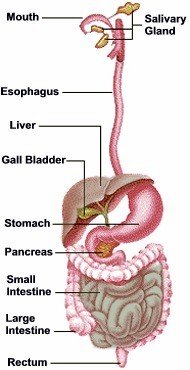How Digestion Works...

Your knowledge of how digestion works is like learning the alphabet in grade school.
Basically, the breaking down of food and drinks and their consequent conversion into nutrients that will nourish the body is called digestion.
These nutrients will be broken down into smaller molecules for your blood to absorb it, and then carried onto the millions of cells in your body to enable your organs to function normally.
Digestion starts from the moment the food is set on the table using your sense of sight, smell, touch, and hearing. Your senses send signals to the rest of your digestive organs that trigger the release of digestive juices.
As you place your food into your mouth, the digestion process begins.
The food will pass through the hollow organs that are joined together with a long twisted tube starting from your mouth and down to your rectum, after going through other organs that secrete digestive juices, particularly the pancreas and the liver.
The moment you chew your food, it is transported to the different digestive organs and transformed into nutrients that fuel your body.
Although food is the source of our body's survival, generally speaking, you also have to be watchful of what kind of food you eat, and be mindful of the nutrients that come with them. After all, what you eat contributes to whether or not you live a healthier and longer life.
It is a vital concern for you to also take note of the length of time it takes for your food to be digested. Paying attention to your body during this process is essential if you want to know how to improve digestion.
Normal digestion times of a few of the many different foods that we consume are as follows:
- Digestion of vegetables – lettuce, tomato, pepper and other raw veggies – usually take 30-40 minutes; leafy vegetables like spinach, string beans, broccoli take 40 minutes; and root veggies take 50 minutes.
- Fruits like pears and apples have digestion times of 30 to 40 minutes, while watermelon, grapes and other melons have 20- to 30-minute digestion times.
- Animal protein require longer digestion times. For obvious reasons, pork takes 4 to 5 hours to digest! This is followed by beef that takes 3 to 4 hours, chicken which is digested in 2 hours, and fatty fish that take 45 minutes.
- Liquids, specifically water, go directly into the intestines when your stomach is empty, while fruit juices take a quick 15 to 20 minutes.
Overall, the time you eat to the time you see the remains in your stool should last no longer than 24 hours transit time. You can do a simple test by eating some nuts or whole kernel corn because they are the easiest to see in your stool. Check the amount of time from eating to eliminating.
These ideas should give you a clearer picture of how digestion works. If you find yourself taking in food indiscriminately, you may be in for a disease-filled life.
If your transit time is sluggish, consider a natural digestive cleanse to get your body running more smoothly and efficiently.
Start getting in shape and keeping to a healthy lifestyle. If you pay strict attention to the food you eat and give yourself an occasional cleanse, you will have won at least half the battle with a good beginning.
Return from How Digestion Works to Human Digestive System
Return from How Digestion Works to All About Parasites Homepage








New! Comments
Have your say about what you just read! Leave us a comment in the box below.